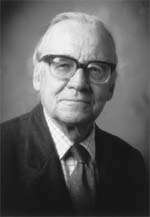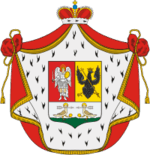Dimitri Obolensky
| Sir Dimitri Obolensky | |
|---|---|
 | |
| Born |
Prince Dmitriy Dmitrievich Obolensky 19 March/1 April 1918 St Petersburg |
| Died |
23 December 2001 (aged 83) Burford, Oxfordshire |
| Occupation | Historian |
| Nationality | naturalised British |
| Notable works |
The Byzantine commonwealth (1971) Bread of Exile: a Russian family, ISBN 1-86046-511-0, Harvill Press |
| Notable awards |
|

Sir Dimitri Obolensky FBA (19 March/1 April 1918 in St Petersburg – 23 December 2001 in Burford, Oxfordshire) was a Russian-born historian who settled in Britain and became Professor of Russian and Balkan History at the University of Oxford and the author of various historical works.
Biography
Prince Dimitri Dimitrievich Obolensky was born in Russia on 1 April 1918 in St Petersburg, the son of Prince Dimitri Alexandrovich Obolensky (1882–1964) and Countess Maria (Shuvalov) (1894–1973). His family was descended from Rurik, Igor, Svyatoslav, St Vladimir of Kiev, St Michael of Chernigov, and Prince Mikhail Semyonovich Vorontsov - however, as one of his students has written, "he was a sober enough scholar to know that Riurik may not actually have existed."[1] After the Russian Revolution, the Royal Navy helped the Obolensky family to escape from Russia in 1919, together with the Dowager Empress Marie Feodorovna and the Grand Duke Nicholas. He was educated in Britain at Lynchmere Preparatory School, Eastbourne, and in France at the Lycée Pasteur in Neuilly-sur-Seine, before going up to Trinity College, where he distinguished himself with a Blue for lawn tennis and graduated in 1940.
Obolensky became a distinguished academic. He was elected a Fellow of Trinity College, Cambridge (1942–48, Honorary Fellow 1991-2001) and Lecturer in Slavonic Studies, University of Cambridge (1946–48). He became a British national in 1948.
From 1949 to 1961 Obolensky was Reader in Russian and Balkan Medieval History at the University of Oxford (1949–61) and subsequently Professor of Russian and Balkan History (1961–85, Emeritus 1985-2001). He was also a Student of Christ Church, Oxford (1950–85, Emeritus 1985-2001). He later became Vice-President of the Keston Institute, Oxford.
Obolensky's most enduring achievement was The Byzantine commonwealth (1971), a large-scale synthesis of the history of the eastern Roman Empire. Other major studies include The Bogomils: a study in Balkan neo-Manichaeism (1946) and Six Byzantine Portraits (1988).
Obolensky was elected a Fellow of the British Academy (1974, Vice-President 1983-85), as well as Fellow of the Society of Antiquaries, and appointed a Knight Bachelor (1984). He was a member of the Athenaeum. In 1988 he returned to Russia as a delegate to the 'Sobor' or Council of the Russian Orthodox Church convoked to celebrate the 1,000th anniversary of the conversion of Russia to Christianity.
Obolensky married Elisabeth Lopukhin in 1947; they had no children, and the marriage was dissolved in 1989.
Sir Dimitri died on 23 December 2001 at Burford in Oxfordshire. His memorial service was held in Christ Church Cathedral, Oxford, and he is buried at Wolvercote Cemetery.

Notes
- ↑ S. Franklin, "Sir Dimitri Obolensky," Proceedings of the American Philosophical Society 148 (2004), 140, www.amphilsoc.org
External links
- Anthony Bryer, Obituary, The Independent (31 December 2001)
- , 'Sir Dimitri Obolensky: Distinguished scholar of Byzantium whose infectious enthusiasm drew students to the fields of Russian and Balkan history', The Guardian (4 January 2002)
- Robin Milner-Gulland, 'Professor Sir Dimitri Obolensky, 1918-2002', Society for the Promotion of Byzantine Studies